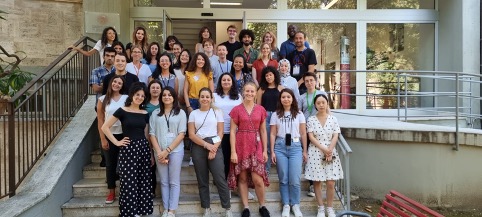International EARA-EASP-EAPP meeting report: “Building Inclusive Identities”
27.02.2024, by Media Account in grant report, meeting report
By Elisabetta Crocetti

The International EARA-EASP-EAPP meeting “Building Inclusive Identities” took place from 18 to 22 September 2023 in Bologna, Italy. The meeting, chaired by Elisabetta Crocetti and Monica Rubini, was a Multidisciplinary RKTS (Research Knowledge Transfer Scheme) organized for the first time by three European Associations (EARA European Association for Research on Adolescence, EASP European Association of Social Psychology, and EAPP European Association of Personality Psychology). The meeting was hosted by the Department of Psychology “Renzo Canestrari”, Alma Mater Studiorum University of Bologna, Italy.
The event aimed to bring together models and methods from developmental, social, and personality psychology with the role of reaching a cross-fertilized, integrated picture of how people can compose their identities along inclusive dimensions.
More specifically, the RKTS focused on the co-construction of knowledge among 24 early career scholars and 6 senior scholars acting as facilitators. The early career scholars were selected from the three European associations: they were highly diverse both in terms of their affiliations (from 10 countries, including Denmark, France, Germany, Ireland, Italy, Poland, Slovakia, Turkey, United Kingdom, United States of America) and even more in terms of their nationalities. The senior scholars consisted of Veronica Benet-Martinez (Universitat Pompeu Fabra, Spain), Susan Branje (Utrecht University, The Netherlands), Oliver Christ (FernUniversität in Hagen, Germany), Elisabetta Crocetti, Francesca Prati, and Monica Rubini (University of Bologna, Italy).
The program of the week was organized in two sections. First, developmental, personality, and social psychological models related to inclusive identities were presented by senior scholars, along with a discussion of empirical research and related methodologies (e.g., longitudinal, experimental, survey). In the second step, early career scholars were invited to develop joint research projects building upon contributions presented in the first section as well as their own interests and prior research on the topic.
The projects developed were the following:
• “How do young Syrian refugees living in Germany integrate and make meaning of different geographical identities?” – Lina Alhaddad, Valeria Bacaro, Anna-Maria Mayer, Chiara Zazzarino
• “Explaining the effects of social identity complexity on intergroup attitudes” – Emine Bilgen, Luca Fusco, Xenia Daniela Poslon, Mariacarolina Vacca, Ayse Sule Yuksel
• “Identity integration of seemingly incompatible identities: The impact of the perceived rejection of being both” – Dora Bianchi, Lisa De Luca, Michael Edem Fiagbenu, Liliyana Mbeve, Béatrice Sternberg (Veronica)
• “Can men be feminist? Exploring the relationship between male and feminist identifications with individual and intergroup outcomes” – Maria Chiara Basilici, Beatrice Bobba, Lucía Estevan-Reina, Anna Huang, Fau Rosati
• “Towards inclusive societies: Understanding identity complexity’s role in fostering supportive behaviors” – Chiara Imperato, Sara Panerati, Joshua Parmenter, Bao-Thi Van Cong, Mei Xie
A rich social program aimed to explore diversity of people, food, and places was organized by the Organizing Committee consisting of Beatrice Bobba, Stefano Ciaffoni, Francesca De Lise, Mohammad Mohsen Khoddami, Fabio Maratia, Maria Pagano, Sara Panerati, Denise Ruggieri (University of Bologna). The collective sharing of leisure time facilitated exchanges and networking among participants.
We look forward to the implementation of the research projects and future collaborations inspired by the cross-fertilization approach adopted by this inter-associations event.